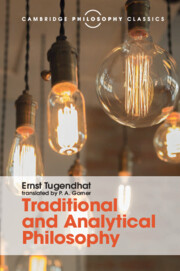Book contents
- Frontmatter
- Dedication
- Contents
- Preface
- Preface
- Translator's preface
- Part I Introduction: confrontation of analytical philosophy with traditional conceptions of philosophy
- Part II A first step: analysis of the predicative sentence
- 8 Preliminary reflections on method and preview of the course of the investigation
- 9 Husserl's theory of meaning
- 10 Collapse of the traditional theory of meaning
- 11 Predicates: the first step in the development of an analytical conception of the meaning of sentences. The dispute between nominalists and conceptualists
- 12 The basic principle of analytical philosophy. The dispute continued. Predicates and quasi-predicates
- 13 The meaning of an expression and the circumstances of its use. Dispute with a behaviouristic conception
- 14 The employment-rule of an assertoric sentence. Argument with Grice and Searle
- 15 Positive account of the employment-rule of assertoric sentences in terms of the truth-relation
- 16 Supplements
- 17 ‘And’ and ‘or’
- 18 General sentences. Resumption of the problem of predicates
- 19 The mode of employment of predicates. Transition to singular terms
- 20 What is it for a sign to stand for an object? The traditional account
- 21 The function of singular terms
- 22 Russell and Strawson
- 23 What is ‘identification’?
- 24 Specification and identification. Specification and truth
- 25 Spatio-temporal identification and the constitution of the object-relation
- 26 Supplements
- 27 Results
- 28 The next steps
- Bibliography
- Index of names
- Index of subjects
11 - Predicates: the first step in the development of an analytical conception of the meaning of sentences. The dispute between nominalists and conceptualists
from Part II - A first step: analysis of the predicative sentence
Published online by Cambridge University Press: 05 August 2016
- Frontmatter
- Dedication
- Contents
- Preface
- Preface
- Translator's preface
- Part I Introduction: confrontation of analytical philosophy with traditional conceptions of philosophy
- Part II A first step: analysis of the predicative sentence
- 8 Preliminary reflections on method and preview of the course of the investigation
- 9 Husserl's theory of meaning
- 10 Collapse of the traditional theory of meaning
- 11 Predicates: the first step in the development of an analytical conception of the meaning of sentences. The dispute between nominalists and conceptualists
- 12 The basic principle of analytical philosophy. The dispute continued. Predicates and quasi-predicates
- 13 The meaning of an expression and the circumstances of its use. Dispute with a behaviouristic conception
- 14 The employment-rule of an assertoric sentence. Argument with Grice and Searle
- 15 Positive account of the employment-rule of assertoric sentences in terms of the truth-relation
- 16 Supplements
- 17 ‘And’ and ‘or’
- 18 General sentences. Resumption of the problem of predicates
- 19 The mode of employment of predicates. Transition to singular terms
- 20 What is it for a sign to stand for an object? The traditional account
- 21 The function of singular terms
- 22 Russell and Strawson
- 23 What is ‘identification’?
- 24 Specification and identification. Specification and truth
- 25 Spatio-temporal identification and the constitution of the object-relation
- 26 Supplements
- 27 Results
- 28 The next steps
- Bibliography
- Index of names
- Index of subjects
Summary
The object-orientated conception of the meaning of predicative sentences foundered on the question of how the meaning of the whole sentence results from the meanings of the sentence-components. The only answer the object-orientated position could give was: the meaning of the whole sentence is composed of that for which the singular term stands and that for which the predicate stands. This answer led to the dilemma: either the composition must be construed as the real composition of a complex object or one cannot say what is to be understood by composition here without presupposing precisely that understanding of the sentence which was to be explained.
This result is not purely negative, inasmuch as it prescribes a specific direction of enquiry for a new, no longer object-orientated attempt at an explanation. Firstly, understanding of the predicate has emerged as the – from an object-orientated point of view – critical element in the understanding of a predicative sentence. We will thus first have to try to achieve a new and no longer object-orientated conception of the understanding of a predicate. Secondly, it has at the same time become clear that the problem of the understanding of a predicate – the second of my four questions (see p. 109) – is directly connected with our third question, viz. how we understand the combination of the singular term with the predicate. It would therefore seem plausible that these two questions should now be combined. This gives a concrete clue to the enquiry into the understanding of a predicate. Were we simply to formulate the question concerning the understanding of the predicate thus: what is it to understand a predicate if this understanding cannot consist in the consciousness of an object? we would have no positive clue as to how we should proceed. If, on the other hand, we combine the second question with the third and hold fast to the idea that at any rate the singular term stands for an object, we can ask: if the supplementation of the singular term by a predicate does not have the function of combining the object of the singular term with another object (that of the predicate) how then is it to be understood?
- Type
- Chapter
- Information
- Traditional and Analytical PhilosophyLectures on the Philosophy of Language, pp. 140 - 158Publisher: Cambridge University PressPrint publication year: 2016

